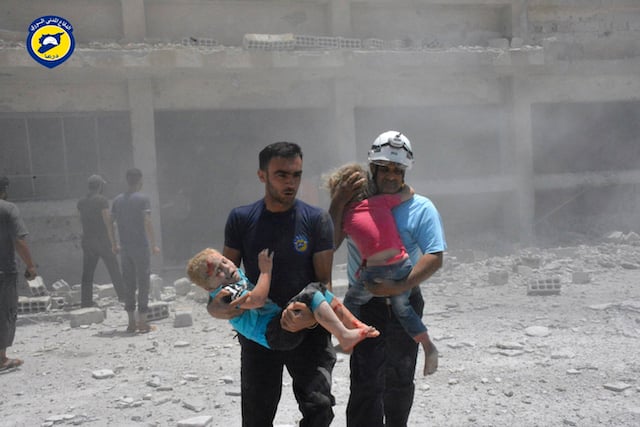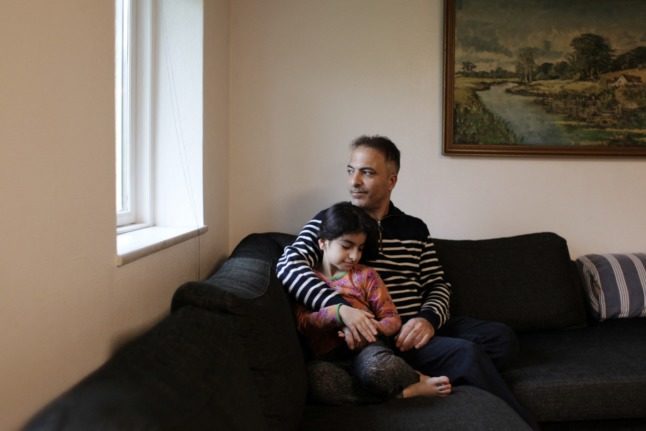Germany has confirmed it will resettle roughly 50 of the 800 White Helmet rescuers and their families evacuated by Israel to Jordan due to the imminent threat of advancing Syrian regime forces.
Founded in 2013, the Syria Civil Defence, or White Helmets, is a network of first responders which rescues the wounded in the aftermath of air strikes, shelling or explosions in rebel-held territory.
German Interior Minister Horst Seehofer told Bild newspaper on Sunday that Germany would take in eight White Helmets members and their families, having already issued the residency permits.
This means that the White Helmets and their families, all Syrian, won’t have to apply for asylum after their arrival in Germany.
Clause 22 of Germany’s Residence Act allows admission from abroad “on the grounds of international law or urgent humanitarian reasons”.
The move was “a reflection of my stance towards ensuring human morality and order in migration policy,” Seehofer said.
Jordan “authorised the United Nations to organise the passage of 800 Syrian citizens through Jordan to be resettled in western countries,” Jordanian foreign ministry spokesman Mohammed al-Kayed said.
“The government gave the permission after Britain, Germany and Canada made a legally binding undertaking to resettle them within a specified period of time due to 'a risk to their lives'.”
German foreign Minister Heiko Maas (SPD) has also confirmed the resettlement of several White Helmets and their families in Germany, roughly 50 refugees.

An Israeli government source confirmed Israel's military had rescued 800 people who were taken to Jordan.
“Upon request of the US, Canada and European states Israel has completed a humanitarian effort to rescue members of a Syrian civil organisation ('White Helmets') and families,” Israeli foreign ministry spokesman Emmanuel Nahshon tweeted.
White Helmets head Raed Saleh said the evacuees had arrived in Jordan after being “surrounded in a dangerous region”.
They had been encircled in the Syrian provinces of Daraa and Quneitra, which respectively border Jordan and the Israeli-occupied Golan Heights, he told AFP.
Israel seized 1,200 square kilometres (460 square miles) of the Golan from Syria in 1967, in a move never recognised internationally.
Britain's Foreign Office said it had helped facilitate the overnight evacuations.
“White Helmets have been the target of attacks and, due to their high profile, we judged that, in these particular circumstances, the volunteers required immediate protection,” it said.
Canadian Foreign Minister Chrystia Freeland said she had “called for global leadership to support and help these heroes” at last week's NATO summit.
The North American nation will take in up to 50 White Helmets volunteers and their families, totalling up to 250 people, the country's public broadcaster CBC said citing senior officials.
Israel's Haaretz daily said the evacuees also included orphans who had been injured in the Syrian fighting.
It was unclear how many White Helmet volunteers remained in both the Daraa and Quneitra provinces after the evacuations.
But a volunteer in Daraa city, who asked to remain anonymous, said he had decided to stay despite being given the choice to leave.
“It's our country and we have a right to live in it in safety,” he told AFP, however adding he was among a minority who wished to remain.

“We are first and foremost a humanitarian organisation, not a military one, or a terrorist one as the regime alleges.”
The White Helmets have rescued thousands of civilians trapped under the rubble or caught up in fighting in opposition-held zones along various fronts of Syria's seven-year conflict.
Since its formation, when Syria's conflict was nearing its third year, more than 250 of its volunteers have been killed.
The group's motto — “To save one life is to save all of humanity” — is drawn from a verse in the Koran, although the White Helmets insist they treat all victims, regardless of religion.
– Thousands flee –
Some members have received training abroad, including in Turkey, returning to instruct colleagues on search-and-rescue techniques.
The group receives funding from a number of governments, including Britain, Germany and the United States, but also solicits individual donations to purchase equipment such as its signature hard hats.
On June 19, Syrian government forces launched a Russia-backed offensive to retake Daraa and Quneitra provinces.
Just a month later, regime forces have regained control of most of these two provinces through a combination of deadly bombardment and Moscow-brokered surrender deals.
Jihadists are not party to these deals, and Russian planes bombarded a holdout of the Islamic State group in Daraa province overnight, a Britain-based war monitor said.
More than 20,000 civilians have escaped bombardment on the IS-held corner in the past 24 hours, fleeing into regime-held areas, the Syrian Observatory for Human Rights said.



 Please whitelist us to continue reading.
Please whitelist us to continue reading.
Member comments